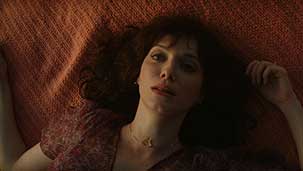You’re best known as Joan Harris, the chilly office manager at the fictional ad agency in Mad Men. Joan is the proud figurehead of the Good Ship Sterling Cooper & Partners, and not just because of her bombshell appearance. She’s the confident queen bee, feared, respected. But beneath the facade she’s a complicated, vulnerable woman. Joan is a character that comes along once in an actor’s lifetime. The kind of role that really showcases your gifts, and, no doubt, the kind of role that spoils you for future work. Especially roles like God’s Pocket, in which your character is a literal figurehead: sculpted, wooden, and designed to lead men into a storm.
God’s Pocket is the passion project of your Mad Men co-star John Slattery. It’s not only his feature directorial debut—he also co-wrote the script (adapted from Peter Dexter’s novel) and produced. You’re part of a dream cast of character actors he has assembled to tell the story of God’s Pocket, a gritty neighbourhood in the late-70s full of losers and crooks. Slattery, who has directed several Mad Men episodes, is obviously comfortable filming detailed period pieces; the art direction in God’s Pocket excels in capturing the colours, designs, and setting of the era while still managing to give the film a sense of timelessness.
But the film’s problem isn’t style, its substance.
You, of course, have no problem drifting through this bygone world. You play Jeanie, the mother of sociopathic loud-mouth Leon, who gets killed at his blue-collar job. You beg your husband Mickey to find out what really happened to Leon, while ensuring that he gets a proper funeral. Problem is, Mickey, a low-level crook, has no cash, and his boss, Arthur, is into the local loan shark for 20-Large. Meanwhile, local newspaper columnist Richard Shelburne, an alcoholic has-been and third-rate celebrity, gets involved in your case. But, of course, he ends up falling in love with you.
So what do you do? You sob, you sleep, you glare, you sashay around in too-tight house coats—talents perhaps better-suited to your torpid Mad Men co-star January Jones. This left me wondering why Slattery didn’t cast her in this lifeless role. But at least you didn’t have to suffer alone. Philip Seymour Hoffman plays Mickey as a schlubby Philip Seymour Hoffman-type, drifting through scenes covered in flop sweat and self-loathing. And there must have been a surplus of flop-sweat and self-loathing in the make-up trailer, because it’s doused liberally all over Richard Jenkins newspaperman and Eddie Marsan’s slimy funeral home director. What’s left is spritzed over the denizens of the local watering hole, where inveterate drunks get cut off and respond with things like: “You can’t cut off the truth!”
Bet you were missing Matthew Weiner right about then.
The mystery of your son’s death is just one of many unsatisfying threads that unravel into oblivion. There are horse races, dead bodies in meat trucks, unfulfilling sex scenes, and the occasional brutal act of violence—all of which are apparently essential to the ambling plot, though none are particularly intriguing. You only have about fifteen lines in the whole film, and half of them are, “I know something happened to Leon, I just know!” Your job is to pose with laundry, in dirty kitchens, while being alternately avoided and pursued. This may be God’s Pocket, but it’s still a man’s world.
God’s Pocket feels like three separate movies. And none of them moved me. Particularly because in their attempt to combine unflinching, urban drama and dry humour, they succeeded at neither. This must have been particularly frustrating for you, since you’re so used to balancing both as the acid-tongued Joan. It’s even more unfortunate since John Slattery’s Roger Sterling is legendary for delivering some of Mad Men’s best lines while having arguably the most surprising character evolution on the show. It’s obvious, though, that his strengths as a director lie in visual storytelling. The writing of copy is a skill best left to somebody else.
I’m just sorry that you have to go back to the 60s to play a female character who is more than just a pretty face.
Here’s Looking At You,
Di






